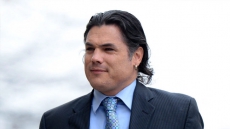HALIFAX — It was their last hope of preventing a potential environmental disaster.
Buffeted by gale-force winds, three Canadian Coast Guard members gripped the rails of a 145-metre long barge that had been cut adrift in a storm in St. George's Bay, near Port Hood, N.S.
The ship, with as much as 34,000 litres of diesel fuel on board, was being propelled toward the pristine beaches of Henry Island. The team couldn't get a tow line, and decided they had to try to anchor the barge where it was.
The team's engineer, John Seymour, tried to steady himself on the heaving ship, as he bashed the anchor with a piece of timber, again and again.
Finally, it gave. The boat tipped on its side, splashing the crew with cold water as the five-metre waves lapped closer to the railing. The barge had been stopped less than a kilometre from shore.
"We got it literally just in the nick of time," rescue specialist Peter Cowan said in an interview.
On Wednesday, more than eight years after the Dec. 17, 2007, rescue, five members of the CCGS Edward Cornwallis crew are among more than 70 Atlantic Canadians who will receive decorations from Governor-General David Johnston in Halifax.
Cowan said Tuesday he's looking forward to seeing his old shipmates, some of whom have retired or lost touch since that fateful day barely a week before Christmas.
The Cornwallis had been docked in Mulgrave, N.S., to take refuge from a winter storm.
Not far away, the American tug Eileen M. Roehrig had lost its tow of its barge, Houston, to the savage Gulf of St. Lawrence currents the previous night.
The Coast Guard dispatched the Cornwallis crew to board the barge, while the CCGS Terry Fox stood nearby readying its tow gear.
With five people on board, the rescue craft approached the lee side of the hulking vessel, which was perforated with small "step holes." Cowan, Seymour and rescue specialist Paul York jumped amidst heaving waves and scaled 7.5 metres up the boat.
"(We) kind of scrambled up the pigeon holes before we either fell off, or got wet, or got crushed by the boats," Cowan said. "One, two, three — jump!"
The men scoured the ship for a towing line they could pass remaining crew members to bring to the Terry Fox.
After several attempts to pass a line, the weather deteriorated, with 70 km/h winds and intermittent snow squalls.
"It was drifting to a critical point near shore where we had to change focus," Cowan said. "One of the things we were concerned about was if we were able to let the anchor go, would we be able to stop the anchor?"

Once they freed the anchor, the team manually controlled its release, securing the barge about half an hour before it would have hit shore.
The crew had to remain on board without food and water due to the severe conditions. As evening approached, Seymour managed to get the generators going for warmth, and to light the deck for the two helicopters aiding the mission.
At around 6 p.m. a helicopter hoisted the crew from the deck.
"This guy came out of the sky, put a horse collar on me, put his arms around me in a hug and the next thing I knew I was in the helicopter ... safe and sound," Seymour said, according to a Coast Guard report.
Cowan, Seymour and York were flown to CFB Greenwood, where they were greeted with applause from their shipmates and cookies on their bunks.
"Any time that you do something, it's nice to have people recognize it," Cowan said.
"The cookie was probably more valuable at the time, but ... as far as personal achievements and stuff that makes it on the resume, I have to give it to the Governor-General."
On Dec. 19, the tug returned to recover the barge with the assistance of the Cornwallis crew.
On Wednesday, Cowan, Seymour, York, Anthony Kelly and Byron Samson will receive medals for meritorious service, an award bestowed upon those "who have performed an exceptional deed or activity that brings honour to Canada," according to a statement from Rideau Hall.




